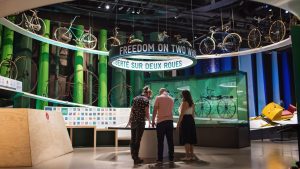When Ian Fraser took the top job at Run Ottawa in 2019, he had no idea how much he’d need to lean on every ounce of experience he’d gained through two decades as an entrepreneur.
The former competitive triathlete had owned and operated several successful fitness-related businesses, including race organizer Somersault Events and bike shop Cyclelogik, before being named executive director of the non-profit organization that stages Ottawa Race Weekend.
Fraser knew he faced a few hurdles as he tackled his new role. Race Weekend’s numbers had been declining throughout the decade, falling from 48,000 in 2014 to 33,000 four years later, and the new race director set out to find new ways to get the community more involved in the event and attract more runners from out of town.
OBJ360 (Sponsored)

Foster employee wellness and show your appreciation with Ingenium
Helping employers better connect with employees, and their families, is the thinking behind the corporate memberships offering from Ingenium.

uOttawa’s Kanata North campus marks 5 years in Canada’s largest tech park
Whether companies are looking to expand R&D activities, grow their teams, or capitalize on funding opportunities, uOttawa has been there to help.
Then, a few months into his tenure, the pandemic changed everything.
With major public gatherings suddenly a no-go, Fraser was forced to completely rethink how Race Weekend and the 20 or so other events Run Ottawa hosts each year – including this month’s “Run Fast or Freeze” event in support of the United Way – would operate.
‘Tools and tricks’ of the trade
The organization typically covers about 85 per cent of its $4-million annual budget through registration fees, and shelving mass-start races in favour of “virtual” runs where participants logged kilometres on their own would surely put a huge dent in its revenues.
Faced with a major challenge, Fraser channelled his inner entrepreneur to find solutions.
“I’ve kind of pulled back the tickle trunk and pulled some old tools and tricks out of there that I can apply to what we’re having to do during the pandemic,” the Ottawa native, who began running when he was eight years old, says with a chuckle. “It’s been really challenging and really interesting.”
Fraser quickly realized that his organization, despite being a non-profit, had to respond to the unprecedented circumstances like any other business.
Just as brick-and-mortar retailers began retooling their operations to offer online storefronts as the pandemic raged, Run Ottawa also turned to e-commerce as a new source of income.
“I said, ‘It’s not a stretch to look at ourselves as retailers. We’ve just retailed race registrations for the better part of four decades,’” Fraser recalls telling his four-person team a few months ago. “We’ve just never really looked at ourselves that way.”
Now, in addition to registering for virtual running events, visitors to the group’s website can buy products such as chocolate protein wafers from Montreal-based xact nutrition and merchandise like gloves and a three-layered neck warmer that doubles as a protective facemask.
“What we wanted to do was think about our brand,” Fraser explains. “We’re positioning ourselves a little bit more as a lifestyle brand.”
This week, Run Ottawa unveiled its latest retail partnership: it began offering Tempo Blend, a mix of Guatemalan and Rwandan coffee beans from the Artery Community Roasters, a new social enterprise founded by Fraser’s longtime friend Will Wells.
Proceeds to charity
A portion of proceeds from the sale of Tempo Blend will be donated to ABLE2, a local charity that supports people living with disabilities. The coffee itself is blended, packaged and delivered by workers with disabilities, a segment of the population that often faces significant barriers to finding gainful employment.
The idea of helping less fortunate citizens of Ottawa while putting extra money into his organization’s coffers struck a chord with Fraser. Even though many people “run in little pockets” of five or six, he says, we’re all residents of the same city – and the message that “we’re in this together” has never been more important, he adds.
“There’s this whole community that is in some ways interconnected, but we could be that catalyst to really connect all the parts of the community,” he says.
Meanwhile, Fraser isn’t through diversifying Run Ottawa’s revenue streams.
Merchandise sales
The organization is ramping up sales of branded merchandise such as T-shirts and preparing to roll out other products, including an “energy box” full of protein powders, fruit bars and other nutritious nuggets that will be delivered to subscribers on a monthly basis.
With registration for May’s month-long slate of virtual Race Weekend events likely to fall far short of traditional marks – “If we did 10,000, I would be over the moon,” Fraser says – Run Ottawa will take new business anywhere it can get it.
The last year has been a trial by fire, but he believes the organization will come out the other side of COVID-19 stronger and more resilient as a result.
“It’s only because of the pandemic, I think, that we’re able to see some of these opportunities that are there and be able to test-drive them,” Fraser says. “I think that a lot of them are going to work post-pandemic.”





